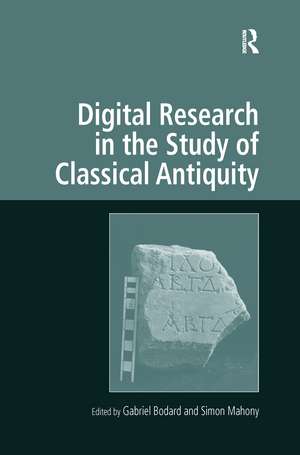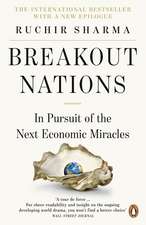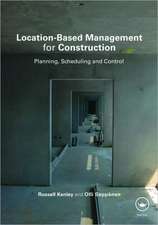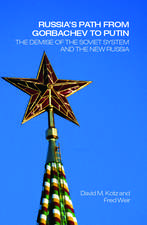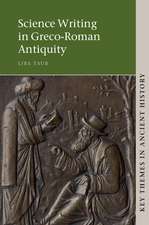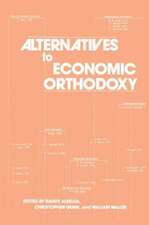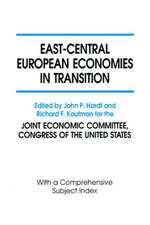Digital Research in the Study of Classical Antiquity: Digital Research in the Arts and Humanities
Editat de Simon Mahony, Gabriel Bodarden Limba Engleză Paperback – 11 noi 2016
| Toate formatele și edițiile | Preț | Express |
|---|---|---|
| Paperback (1) | 337.84 lei 6-8 săpt. | |
| Taylor & Francis – 11 noi 2016 | 337.84 lei 6-8 săpt. | |
| Hardback (1) | 822.36 lei 6-8 săpt. | |
| Taylor & Francis – 28 mai 2010 | 822.36 lei 6-8 săpt. |
Din seria Digital Research in the Arts and Humanities
-
 Preț: 311.33 lei
Preț: 311.33 lei -
 Preț: 312.09 lei
Preț: 312.09 lei - 20%
 Preț: 946.37 lei
Preț: 946.37 lei -
 Preț: 324.93 lei
Preț: 324.93 lei - 9%
 Preț: 935.99 lei
Preț: 935.99 lei - 20%
 Preț: 247.23 lei
Preț: 247.23 lei -
 Preț: 311.28 lei
Preț: 311.28 lei -
 Preț: 281.45 lei
Preț: 281.45 lei -
 Preț: 325.94 lei
Preț: 325.94 lei - 13%
 Preț: 338.33 lei
Preț: 338.33 lei - 31%
 Preț: 766.31 lei
Preț: 766.31 lei - 18%
 Preț: 1000.27 lei
Preț: 1000.27 lei - 16%
 Preț: 335.37 lei
Preț: 335.37 lei -
 Preț: 460.69 lei
Preț: 460.69 lei - 18%
 Preț: 1003.64 lei
Preț: 1003.64 lei - 22%
 Preț: 324.16 lei
Preț: 324.16 lei - 31%
 Preț: 764.20 lei
Preț: 764.20 lei -
 Preț: 401.14 lei
Preț: 401.14 lei - 20%
 Preț: 1053.91 lei
Preț: 1053.91 lei -
 Preț: 389.38 lei
Preț: 389.38 lei - 28%
 Preț: 819.90 lei
Preț: 819.90 lei -
 Preț: 417.03 lei
Preț: 417.03 lei - 16%
 Preț: 339.10 lei
Preț: 339.10 lei -
 Preț: 389.38 lei
Preț: 389.38 lei -
 Preț: 383.24 lei
Preț: 383.24 lei - 16%
 Preț: 311.31 lei
Preț: 311.31 lei -
 Preț: 489.26 lei
Preț: 489.26 lei -
 Preț: 469.34 lei
Preț: 469.34 lei - 18%
 Preț: 1004.55 lei
Preț: 1004.55 lei - 18%
 Preț: 1005.67 lei
Preț: 1005.67 lei - 18%
 Preț: 999.46 lei
Preț: 999.46 lei - 18%
 Preț: 1000.27 lei
Preț: 1000.27 lei -
 Preț: 489.26 lei
Preț: 489.26 lei - 18%
 Preț: 1000.27 lei
Preț: 1000.27 lei - 18%
 Preț: 1058.65 lei
Preț: 1058.65 lei - 18%
 Preț: 1000.27 lei
Preț: 1000.27 lei - 13%
 Preț: 338.33 lei
Preț: 338.33 lei - 30%
 Preț: 878.82 lei
Preț: 878.82 lei - 26%
 Preț: 764.20 lei
Preț: 764.20 lei
Preț: 337.84 lei
Preț vechi: 401.67 lei
-16% Nou
Puncte Express: 507
Preț estimativ în valută:
64.64€ • 67.49$ • 53.50£
64.64€ • 67.49$ • 53.50£
Carte tipărită la comandă
Livrare economică 04-18 aprilie
Preluare comenzi: 021 569.72.76
Specificații
ISBN-13: 9781138252165
ISBN-10: 1138252166
Pagini: 230
Dimensiuni: 156 x 234 mm
Greutate: 0.43 kg
Ediția:1
Editura: Taylor & Francis
Colecția Routledge
Seria Digital Research in the Arts and Humanities
Locul publicării:Oxford, United Kingdom
ISBN-10: 1138252166
Pagini: 230
Dimensiuni: 156 x 234 mm
Greutate: 0.43 kg
Ediția:1
Editura: Taylor & Francis
Colecția Routledge
Seria Digital Research in the Arts and Humanities
Locul publicării:Oxford, United Kingdom
Notă biografică
Dr Gabriel Bodard is Research Associate at the Centre for Computing in the Humanities, KCL and Simon Mahony is at the University College London, UK
Recenzii
'A productive interdisciplinary collaboration among computer scientists, engineers, classicists, and other humanities researchers within an open community of scholars sharing complementary skills and interests ... Perusing the contents of this stimulating volume, a representative sampling of innovative projects that employ advanced digital technologies, one feels much as Da Gama must have felt gazing out across the vast, variegated landscape of a world as yet unexplored.' John Bodel, Brown University, USA 'Where once scholars considered how to apply IT to the study of the ancient world, now we must consider how to place the study of the ancient world within 'digital knowledge'. This has required us to rethink the classifications, collaborations and alliances with which we have operated for so long, and to consider the new audiences (expert and inexpert) who will look at, and sometimes contribute to, our resources and scholarship. This volume reflects the achievements, the potential and the challenges of this situation. It brings together practitioners from a diverse range of specialisms within classics: epigraphy and papyrology, literary and linguistic study, archaeology, numismatics. Their contributions demonstrate progress in digitization, but beyond that, they explore the wider context (academic and technical) in which digital classics must now function'. Elaine Matthews, University of Oxford, UK ’Taken as a whole, this multidisciplinary book can inspire future research, future writers and future creations in the field of classical studies.'’ Online Information Review
Cuprins
Introduction, Simon Mahony, Gabriel Bodard; Part I Archaeology and Geography; Chapter 1 Silchester Roman Town: Developing Virtual Research Practice 1997-2008, Michael G. Fulford, Emma J. O'Riordan, Amanda Clarke, Michael Rains; Chapter 2, Sebastian Heath; Chapter 3 Space as an Artefact: A Perspective on 'Neogeography' from the Digital Humanities, Stuart Dunn; Part II Text and Language; Chapter 4 Contextual Epigraphy and XML: Digital Publication and its Application to the Study of Inscribed Funerary Monuments, Charlotte Tupman; Chapter 5 A Virtual Research Environment for the Study of Documents and Manuscripts, Alan K. Bowman, Charles V. Crowther, Ruth Kirkham, John Pybus; Chapter 6 One Era's Nonsense, Another's Norm: Diachronic Study of Greek and the Computer, Notis Toufexis; Part III Infrastructure and Disciplinary Issues; Chapter 7 Digital Infrastructure and the Homer Multitext Project, Neel Smith; Chapter 8 Ktama es aiei: Digital Permanence from an Ancient Perspective, Hugh A. Cayless; Chapter 9 Creating a Generative Learning Object (GLO): Working in an 'Ill-Structured' Environment and Getting Students to Think, Eleanor OKell, Dejan Ljubojevic, Cary MacMahon; Chapter 10 The Digital Classicist: Disciplinary Focus and Interdisciplinary Vision, Melissa Terras;
Descriere
This book explores the challenges and opportunities presented to Classical scholarship by digital practice and resources. Drawing on the expertise of a community of scholars who use innovative methods and technologies, it shows that traditionally rigorous scholarship is as central to digital research as it is to mainstream Classical Studies. This volume exemplifies the collaborative and interdisciplinary nature at the heart of Classical Studies.
